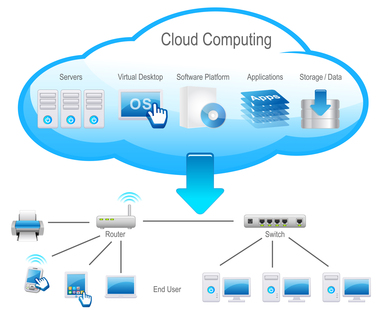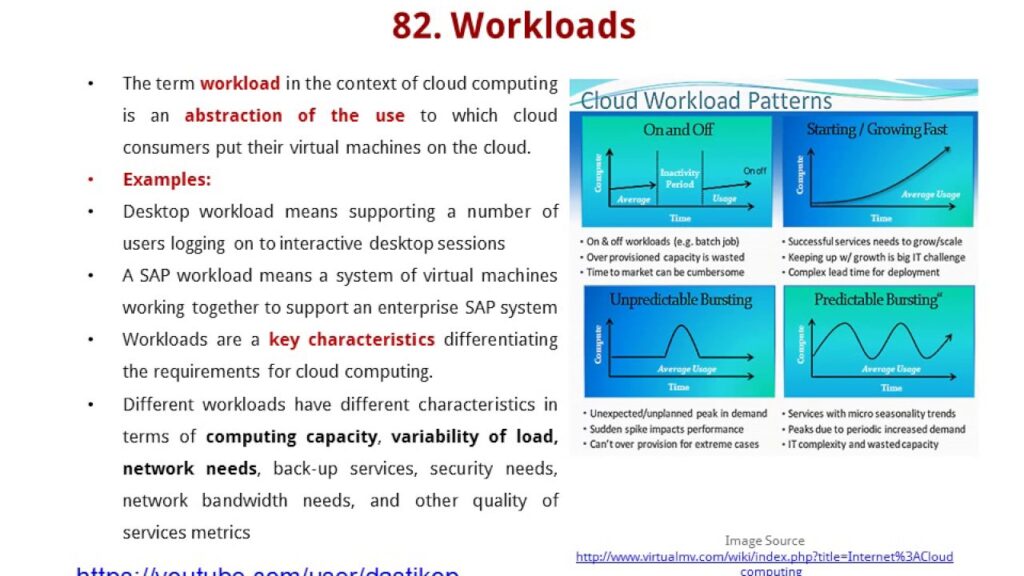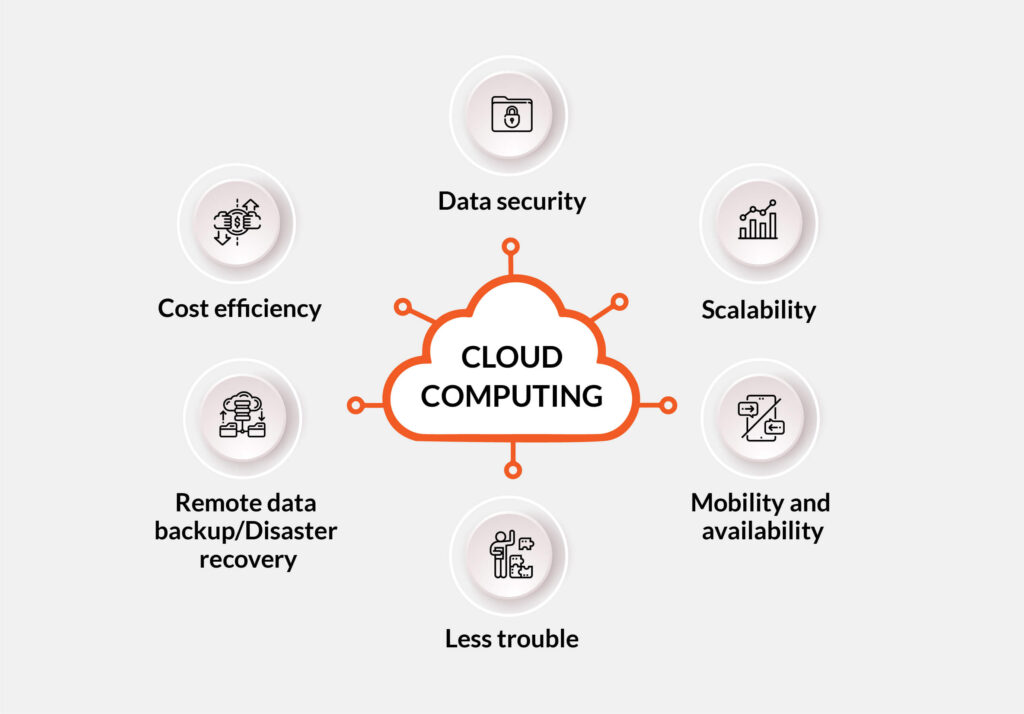In just a few short years, cloud computing has evolved from a buzzword to a critical component of modern business. It’s transformed the way companies operate, from small startups to large corporations, by enabling access to a range of technologies and services that were once out of reach. Thanks to cloud computing, businesses can now operate more efficiently, save money, and improve their bottom line.
The rise of cloud computing has been driven by a number of key factors, including the growing importance of data and the need for businesses to be more agile and responsive to changing market conditions. By moving their operations to the cloud, companies can access a range of services and resources that were once only available to large enterprises. From software and storage to computing power and analytics, the cloud has become an indispensable tool for businesses of all sizes. In this article, we’ll explore some of the ways cloud computing has changed business and what it means for the future of work.

How Has Cloud Computing Changed Business?
Cloud computing has become a valuable asset to businesses of all sizes. The technology has revolutionized the way businesses operate by providing greater scalability, increased mobility, and improved collaboration. By allowing businesses to store and access data, software, and applications from remote servers, cloud computing has enabled businesses to reduce costs and improve productivity. In this article, we will explore how cloud computing has changed business and the benefits that it provides.
Increased Mobility
Cloud computing has enabled businesses to become more mobile. With cloud computing, employees can access their data, applications, and software from any device, at any time. This allows employees to work remotely, which boosts productivity and flexibility. Additionally, the cloud allows businesses to access data and applications in multiple locations, which increases efficiency and reduces costs associated with data storage and maintenance.
Cloud computing also makes it easier for businesses to collaborate with remote employees or customers. By allowing all involved parties to access the same data and applications from anywhere, cloud computing has enabled businesses to reduce communication gaps and streamline processes.
Cost Savings
Cloud computing allows businesses to reduce their IT costs by eliminating the need to purchase and maintain expensive hardware and software. Instead, businesses can access data, applications, and software online for a fraction of the cost. Additionally, cloud computing reduces the need for on-site IT personnel, which further reduces costs.
Cloud computing also allows businesses to pay for the exact amount of storage, computing power, and bandwidth that they need. This eliminates the need to purchase more resources than are necessary, which saves money. In addition, businesses can often pay as they go, which can help to reduce overall costs.
Increased Security
Cloud computing provides businesses with increased security. Cloud providers use stringent security measures to protect data and applications from cyber-attacks and other security threats. Additionally, cloud computing enables businesses to back up their data in a secure, off-site location, which helps to protect against data loss in the event of a disaster.
Cloud computing also enables businesses to update their software and applications with the latest security patches. This helps to protect businesses from security threats and ensures that their data is safe and secure.
Improved Scalability
Cloud computing provides businesses with increased scalability. With cloud computing, businesses can quickly and easily scale up or down as their needs change. This allows businesses to adjust their resources to meet their current needs without having to purchase additional hardware or software.
Additionally, cloud computing allows businesses to access additional resources on demand, when they need them. This eliminates the need to purchase extra capacity in advance, which can save time and money.
Improved Collaboration
Cloud computing has enabled businesses to collaborate more effectively with remote teams and customers. By allowing all involved parties to access the same data and applications from any device, cloud computing has reduced communication gaps and improved collaboration. Additionally, cloud computing has enabled businesses to share files, documents, and applications with ease, which further enhances collaboration.
Cloud computing also provides businesses with access to communication tools, such as video conferencing, which allows businesses to hold virtual meetings with remote employees and customers. This helps to further improve collaboration and reduce the need for in-person meetings.
Conclusion
Cloud computing has revolutionized the way businesses operate. By providing increased mobility, cost savings, increased security, improved scalability, and improved collaboration, cloud computing has enabled businesses to become more efficient and productive. As businesses continue to adopt cloud computing, the technology will continue to change the way businesses operate.
Frequently Asked Questions
Cloud computing has revolutionised the way businesses operate by providing on-demand access to computing resources and solutions. It has enabled companies to scale quickly and efficiently, while reducing costs associated with IT infrastructure. In this article, we will answer some of the most commonly asked questions about how cloud computing has changed business.
How has cloud computing changed businesses?
Cloud computing has had a significant impact on businesses of all sizes. It has enabled companies to access computing resources and solutions on-demand, without having to invest in physical infrastructure. This has allowed businesses to scale quickly and efficiently, while reducing costs associated with IT infrastructure. Cloud computing has also enabled businesses to access data and applications from anywhere in the world, allowing them to collaborate and work more efficiently. Furthermore, cloud computing has enabled businesses to access advanced analytics and AI capabilities, which have allowed them to gain greater insights into their operations.
Overall, cloud computing has allowed businesses to be more agile and responsive to changing market conditions, while also reducing costs associated with IT infrastructure. This has enabled businesses to become more competitive and efficient, and has opened up new opportunities for growth and innovation.
What are the advantages of cloud computing for businesses?
Cloud computing has numerous advantages for businesses, including cost savings, scalability, agility, and access to advanced technologies. For example, businesses can save money on IT infrastructure costs by using cloud computing, as they can access computing resources and solutions on-demand. This also makes it easier to scale quickly and efficiently, as businesses can access more computing power when needed. Furthermore, cloud computing enables businesses to access data and applications from anywhere in the world, allowing them to collaborate and work more efficiently. Additionally, cloud computing allows businesses to access advanced analytics and AI capabilities, which can help them gain greater insights into their operations.
Overall, cloud computing has enabled businesses to become more agile and responsive to changing market conditions, while also reducing costs associated with IT infrastructure. This has enabled businesses to become more competitive and efficient, and has opened up new opportunities for growth and innovation.
What are the risks associated with cloud computing?
Although cloud computing has numerous advantages for businesses, there are some risks associated with it. For example, cloud computing can increase the risk of data breaches and cyberattacks, as data and applications are stored in remote servers and can be accessed from anywhere in the world. Additionally, businesses may be exposed to vendor lock-in, where they are unable to switch to a different cloud provider due to contractual agreements or technical issues. Finally, businesses may be exposed to compliance risks, as they may not be able to adhere to certain regulations due to the cloud provider’s policies.
Overall, businesses should be aware of the risks associated with cloud computing and ensure that they have the necessary security measures in place to protect their data and applications. Additionally, they should review their cloud provider’s terms and conditions to ensure that they are compliant with all applicable regulations.
How can businesses ensure the security of their data in the cloud?
Businesses can ensure the security of their data in the cloud by implementing the necessary security measures. They should start by ensuring that all data is encrypted, both in transit and at rest. This will ensure that only authorized users can access the data. Additionally, businesses should ensure that they have strong authentication protocols in place, such as multi-factor authentication, to ensure that only authorized users can access the data. Furthermore, businesses should ensure that they have the necessary access control measures in place, such as role-based access control, to ensure that only authorized users can access the data.
Finally, businesses should ensure that they have a comprehensive security policy in place that outlines the necessary measures to protect the data. Additionally, they should ensure that all users are trained on the security measures and that all security measures are regularly monitored and updated as needed. By implementing these measures, businesses can ensure that their data is secure in the cloud.
What are the benefits of using cloud computing for disaster recovery?
Cloud computing can be an effective disaster recovery solution for businesses. Cloud-based solutions can provide businesses with the flexibility and scalability needed to recover quickly from disasters. Additionally, cloud solutions can provide businesses with the necessary redundancy and backup solutions to ensure that their data is protected. Furthermore, cloud solutions can provide businesses with the ability to access their data from anywhere in the world, allowing them to quickly resume operations in the event of a disaster.
Overall, cloud-based disaster recovery solutions can provide businesses with the flexibility and scalability needed to quickly recover from disasters. Additionally, cloud solutions can provide businesses with the necessary redundancy and backup solutions to ensure that their data is protected. This can enable businesses to quickly resume operations in the event of a disaster and minimise downtime.

In conclusion, cloud computing has revolutionized the way businesses operate, making them more efficient, agile, and cost-effective. With its vast array of benefits, cloud computing has enabled businesses to scale up or down quickly, access data from anywhere, and collaborate seamlessly with team members across the globe. It has also paved the way for new business models, such as software-as-a-service (SaaS), which has changed the software industry forever.
As cloud computing continues to evolve, businesses need to stay up-to-date with the latest trends and technologies to remain competitive. They must also embrace cloud security practices to protect their data and assets from cyber threats. With the right strategy and approach, cloud computing can help businesses achieve their goals, grow their revenue, and drive innovation. It is clear that cloud computing is not just a buzzword but a game-changer that has transformed the business landscape forever.



